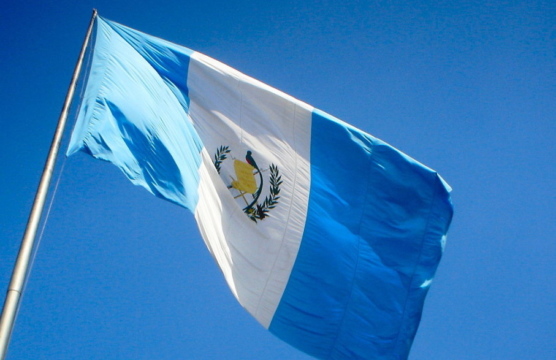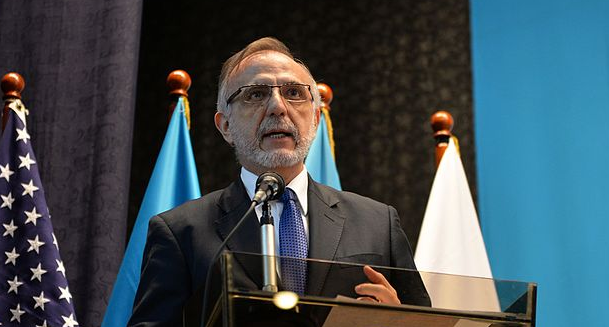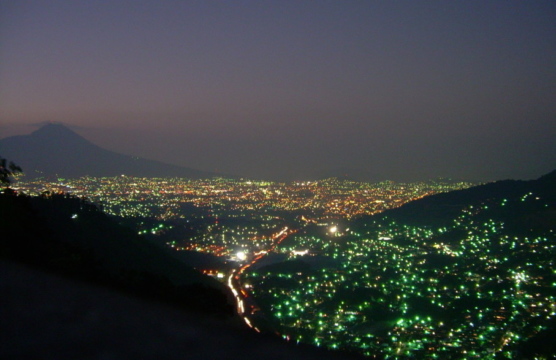
Are Countries Making Progress in Fighting Corruption?
Which countries in the region are making strides in fighting corruption, and which are falling short?
A Daily Publication of The Dialogue
Thousands of Guatemalans have taken to the streets in recent days to protest President Jimmy Morales’ decision not to renew the mandate of the International Commission Against Impunity in Guatemala, or CICIG, and to bar the U.N.-backed anti-corruption panel’s leader, Iván Velásquez, from returning to Guatemala. The situation has intensified as Morales has defied an order from Guatemala’s Constitutional Court that Velásquez be allowed to return. Will Guatemala’s political situation worsen? Has Morales made the moves to neutralize a commission that has investigated him, or has the panel overstepped its bounds? Is Morales’ government more threatened by CICIG’s investigations or by the popular backlash against his government’s moves against it?
Mario Polanco, director of Grupo de Apoyo Mútuo in Guatemala City:“The political crisis that Guatemala is currently going through was brought on by Jimmy Morales, who aims to weaken CICIG to thwart an investigation into his alleged involvement in illicit campaign financing when he was a presidential candidate. He may be ill-advised or perhaps acting on impulse. It must be noted that he has gained sympathy among people and sectors that encourage impunity, especially since his maneuvers have been gradual, with several days in between announcements of new measures that weaken justice, thus avoiding a generalized social backlash. The actions of the president and those who surround him have gone beyond trying to expel CICIG and are aimed at weakening the country’s institutions and encouraging a series of initiatives that could roll back decades of democratic advancement, including the possible dismissal of the ombudsman and judges in the constitutional court and the electoral tribunal. The population has taken to the streets, demonstrating their discontent, but—apart from a march organized for Sept. 20—at present there are no other acts of rejection planned, which heightens the fear that democratic regression will occur.”
Donald J. Planty, senior advisor to Albright Stonebridge Group in Washington and former U.S. ambassador to Guatemala: “There are obviously groups in Guatemala that would like to see the Morales government fail. While the internal situation is complicated, and Morales is not a good communicator, it is unlikely that the government will collapse. While CICIG has opened an investigation of Morales related to illegal campaign contributions, Morales’ moves against CICIG are not fueled by this investigation but rather by an outcry from Guatemalan political, economic and social leaders against what is seen as CICIG’s highhanded tactics and its tendency to assume a supra-national role that trumps Guatemalan sovereignty. CICIG’s arrest and imprisonment of a Russian émigré family (the Bitkovs) and the seizure of their children is an example that has enraged Guatemalans. Guatemalans are quick to point out that Jimmy Morales was duly elected in a free and fair democratic process on a non-corruption platform and, despite his lack of political experience and governing acumen, has sworn to defend Guatemala’s democratic constitution. CICIG’s mandate in Guatemala was twofold: to dismantle illegal security groups and clandestine security organizations and to reform Guatemala’s rule of law institutions. Unfortunately, CICIG in its current manifestation has strayed from this mandate and has improved rule of law institutions only on the margins, especially in the police and the public prosecutor’s office. CICIG’s actions have produced a backlash among powerful segments of the Guatemalan population, and Morales is responding to the attendant political pressure.”
Adriana Beltrán, director for citizen security at the Washington Office on Latin America:“Since its inception, CICIG has assisted in the prosecution of more than 680 individuals including former presidents, senior government officials, influential elites and traffickers. The commission’s work, particularly under Iván Velásquez’s leadership, has exposed criminal and corrupt networks that have co-opted the Guatemalan state. Thanks in large part to CICIG, Guatemala’s impunity rate for homicides decreased almost 10 percent in less than 10 years. Homicides themselves have also declined. Due to these unprecedented results, CICIG is praised internationally as one of the most effective anti-corruption mechanisms and has the support of 70 percent of Guatemalans. However, its effectiveness has also sparked intensifying attacks and mounting pressure from powerful sectors, seeking to avoid justice. Over the last two years, President Morales and his allies have tried to undermine the commission through lobbying efforts, smear campaigns, legislation aimed at limiting anti-corruption work and a failed attempt to declare the commissioner persona non grata, among other actions. President Morales’ most recent move to end CICIG’s mandate, declare the commissioner a ‘threat to public order,’ and bar his re-entry into the country, is an attempt to obstruct justice and avoid accountability for himself, his family and his allies in the face of ongoing investigations. More troublesome, Morales’ refusal to comply with the Constitutional Court ruling that reversed his decision to bar Velásquez from the country and ordered the government to solve disputes through negotiations with the United Nations, would constitute a serious constitutional breach. Fallout from this action threatens regional security and democracy in Guatemala.”
Helen Mack, founder and executive director of the Myrna Mack Foundation: “Morales’ decision may have a negative effect on the country’s political situation. The decision derails possibilities for a change in course that would allow for an improvement in the country’s development. Although CICIG is not a universal panacea for all of Guatemala’s ills, the agency constitutes a beacon of hope in the fight against corruption and impunity that prevails in the very structure of the state. The president’s decisions have aroused suspicion, given that Morales had advocated the fight against corruption at the beginning of his term, and in fact supported CICIG’s work. After pretrial motions were filed against him and after accusations against members of his family, Morales’ position seems to have turned 180 degrees. The threat of persecution and the possibility of imprisonment are the real reasons behind Morales’ decisions. Other measures bear a dangerous resemblance to actions that have been observed in other countries such as in Venezuela and Nicaragua. However, the public is making its rejection heard through popular movements.”
Michael E. Allison, professor and chair of the Department of Political Science at the University of Scranton: “CICIG has established itself as an indispensable instrument in the fight against corruption and impunity in Guatemala. Hundreds of individuals, including several members of the political and economic elite, are awaiting trial or have already been convicted on various corruption charges. Those currently under investigation include President Jimmy Morales and members of his family and political party. As a result, Morales and his allies have launched an all-out assault on CICIG. There is no reason to believe that Morales’ actions have been made in the best interests of the Guatemalan people. After Morales declared CICIG Commissioner Iván Velásquez persona non grata and expelled him from the country in 2017, the Constitutional Court (CC) ruled the order unconstitutional. Officials in favor of CICIG, including the police chief, security minister and chief tax inspector have been unceremoniously removed from their positions. CICIG support personnel have been reassigned. After accusing CICIG of intimidating and terrorizing the Guatemalan people, Morales announced that CICIG’s mandate would not be renewed and that its resources should be transferred to local authorities. He made his outrageous allegations surrounded by dozens of police and military officials, moments after U.S.-supplied military jeeps took up positions outside CICIG’s offices. Morales has refused to allow Velásquez to re-enter the country for ‘reasons of order and public security,’ in violation of the CC’s recent ruling. Morales’ attacks against CICIG and the rule of law are likely to escalate as he seems intent on risking all that Guatemala has recently gained in order to save himself.”
The Latin America Advisor features Q&A with leaders in politics, economics, and finance every business day. The publication is available to members of the Dialogue's Corporate Program and others by subscription.
Which countries in the region are making strides in fighting corruption, and which are falling short?
Organized criminal groups pose an increasing risk to democracy and the rule of law in El Salvador.
Over the past weeks, public discontent with the administration of President Dilma Rousseff has continued to rise.
 CICIG Chief Iván Velásquez // File Photo: U.S. State Department.
CICIG Chief Iván Velásquez // File Photo: U.S. State Department.
 Video
Video